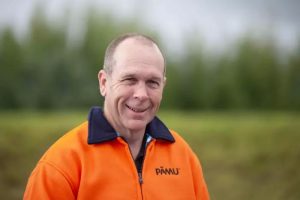
A portrait of a woman with honey blonde hair in a suit jacket.
ACTU president Michele O’Neil is calling on the government to reform a temporary working visa scheme that prevents workers leaving bad bosses and to blacklist dodgy employers who use migration worker exploitation as a business model.
“It is posing a modern day slavery risk,” O’Neil told the ABC.
“Mobility for Pacific Australia Labour Mobility (PALM) visa workers will mean they can move to another approved employer if they need to leave an unscrupulous employer, treating them as disposable labour, and cases where workers face violence or harassment,” she said.
“This will mean employers can no longer treat PALM workers effectively as bonded labourers who can’t change where they work if they want to.”
She has a strong case. Worker exploitation is happening in plain sight across Australia, and while there have been some reforms over the past few years, the PALM scheme is the last of the temporary visa programs where workers are tied, or bonded, to their employer, the sponsor.
It means when things go wrong, such as underpayment, excessive accommodation fees, or other forms of abuse or exploitation, workers don’t have the right to change employers.
If they do leave, they automatically lose their rights, and are labelled absconders or disengaged workers of the scheme.
Thousands of workers are disengaged from the scheme, leaving local communities, social support providers, charities and unions to pick up the pieces.
Investigations underway
O’Neil’s calls for reform are being echoed by charities, councils, state politicians, community workers and the NSW Anti Slavery Commissioner James Cockayne, whose office recently published a report which found evidence of debt bondage forced labour, servitude and deceptive recruiting and human trafficking.
Against this backdrop, a delegation of Fijian officials will arrive in Australia this week to investigate the PALM scheme after 24-year-old Fijian Christine Lewailagi, a worker on the scheme, died in June and her family and friends raised allegations of racism, bullying and exploitation.
The delegation, including the Fijian Minister for Employment Agni Deo Singh, will visit labour exploitation hotspots and meet the Minister for Employment and Workplace Relations Murray Watt, whose department oversees the scheme.
An estimated 45 workers on the PALM scheme died between June 1, 2022 and June 2023.
The PALM scheme was set up to fill labour shortages in agriculture, horticulture and meat processing.
For the most part it has been successful, except when unscrupulous employers exploit weaknesses in the legislation.
Exploited workers in limbo
O’Neil said despite the positive reforms this government has made to strengthen regulation in PALM, including the introduction of a minimum net pay guarantee after deductions, pay parity with workers in the same workplace and increased penalties for employers who exploit temporary migrants, more needed to be done as unscrupulous employers were still exploiting workers.
“As well as mobility rights, allowing workers to change employers, PALM workers should have access to Medicare; better regulations around their labour hire; and access to the Fair Entitlements Guarantee which offers further protections for temporary migrant workers,” she said.
Ezekiel is one of those exploited workers. Now aged 28, he came to Australia from Papua New Guinea two years ago on a PALM scheme by an approved labour hire firm that is being investigated by the Fair Work Ombudsman for abuse and mistreatment of workers.
He left his employer — and therefore the scheme — because he was being paid $200 a week, which wasn’t enough to look after himself and send money to his mother who is looking after his children after his wife died. Ezekiel is from the PNG Highlands, which is currently embroiled in guerilla warfare. His mother was forced to flee the village after his father and two brothers were killed.
He is currently on a 90-day Support to Trafficked People Program, funded by the federal government, but the clock is running down as he waits to find out if he can get a protection visa, given the risks he will face if he returns to PNG.
“If I go back to Papua New Guinea my enemies can kill me and also my kids,” Ezekiel, who is currently living in a hostel in Griffith, told the ABC. “I need to work here in Australia and support my kids and family at home.”
And while the ombudsman is investigating the company that exploited him and many other workers, it has phoenixed, which is a clarion call that more needs to be done in this area.
‘Workers don’t run away from good employers’
O’Neil suggests blacklisting bad employers. “It’s as simple as that,” she said.
She said becoming an approved employer should include the department gathering information to verify ethical behaviour with other bodies, including unions and civil society organisations. She said the Department of Home Affairs should also publish data regarding the number of PALM workers, their employer, their rates of pay, locations, industries and occupations.
Moe Turaga, a Fijian survivor advocate, said there are currently between 300 and 400 disengaged Fijian workers roaming the streets of Sydney, looking for cash jobs, after running away from their employer. They are disempowered and desperate, Turaga said, undocumented and homeless, with no checks and balances.
“Workers don’t run away from good employers,” he said.
Fijian survivor advocate Moe Turaga. (Supplied)
Turaga said he has spoken to over 100 workers in small groups in the past three months. “They have travelled from all over the country because Sydney seems to offer a safe haven,” he said.
He said in the early part of this year, six Fijian workers died in the scheme.
Most businesses do the right thing, Turaga said, but some don’t — and they expect to pay workers $200 a week, after deducting rent, travel and repayment of visas, “which is not okay”.
“The states say it is a federal program, but they are living in the states and they are benefiting the economy, supporting the towns,” he said.
It is why there needs to be buy-in from the states and federal governments.
Anti-slavery bodies need more powers
Ken Dachi, a community worker and multicultural affairs adviser at Leeton Shire Council in the Riverina, NSW, says a Mayoral Alliance for the Pacific, co-founded by Leeton Shire Council and Welcoming Australia, aims to advance reforms to ensure the scheme provides safeguards to workers as well as benefit employers.
“We reached out to 111 councils, largely in New South Wales, Victoria and Queensland and councils continue to join as alliance members,” he said.
There will be a round table meeting between members of the alliance and politicians next month.
“It’s critical that the government brings in the guarantee of 30 hours a week, every week for PALM workers,” O’Neil said.
“If they are making the commitment to uproot their lives and come to Australia, they must be assured that they will receive enough hours of work to support themselves and their families.”
Community worker and multicultural affairs adviser at Leeton Shire Council, Ken Dachi. (ABC News)
There also needs to be greater powers for the Commonwealth Anti Slavery Commissioner, a position that is yet to be filled despite the Albanese government in May announcing its establishment with fanfare.
“We need a Commonwealth Anti-Slavery Commissioner with investigative powers and sufficient resources to give independent oversight to PALM and other temporary migration programs to detect modern slavery and make recommendations for reform in order to help eradicate modern slavery from the supply chains of Australian businesses,” O’Neil said.
In NSW, the Office of the Anti Slavery Commissioner recently published a report that found practices such as debt bondage, forced labour, servitude, deceptive recruiting and human trafficking were rife in agriculture, horticulture and meat processing industries in NSW.
The Modern Slavery Act gives the NSW office no formal investigative powers.
In the words of survivor Moe Turaga, the system needs to change — and fast.
You can now read the most important #news on #eDairyNews #Whatsapp channels!!!
🇺🇸 eDairy News INGLÊS: https://whatsapp.com/channel/0029VaKsjzGDTkJyIN6hcP1K



















